2022 News
November 2022
PhD Course at EPFL
On the 17th, Prof. Poggio gave a lecture at a Ph.D. Course at EPFL on “Advanced microscopy techniques for characterizing magnetic properties of materials” entitled, “Nanomagnetic Imaging using Scanning Probe Micrsoscopy Techniques” (video). The lecture was based — in part — on our recent review entitled, “Nanoscale magnetic field imaging for 2D materials”. Download the slides and lecture notes here; see videos of all the school talks here.
Holiday Feijoada
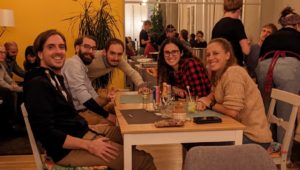 On the evening of Wednesday the 16th, the group had its annual holiday/year-end dinner. This year we went to the Tapiocarhy Brazilian restaurant on Allschwilerstrasse in Basel for a special feijoada event. Feijoada is a tasty Brazilian stew of beans and meat and was served by the restaurant along with typical appetizers, side-dishes, and dessert. Group members enjoyed the food along with beer, caipirinha, and various fresh-squeezed juices. Thanks to all for a good time! Pictures are here.
On the evening of Wednesday the 16th, the group had its annual holiday/year-end dinner. This year we went to the Tapiocarhy Brazilian restaurant on Allschwilerstrasse in Basel for a special feijoada event. Feijoada is a tasty Brazilian stew of beans and meat and was served by the restaurant along with typical appetizers, side-dishes, and dessert. Group members enjoyed the food along with beer, caipirinha, and various fresh-squeezed juices. Thanks to all for a good time! Pictures are here.
Zurich Instruments Interview
In mid-November Zurich Instruments published an interview with Prof. Poggio in its newletter. The interview mostly covered his new role — as of August of 2022 — as director of the Swiss Nanoscience Institute (SNI).
October 2022
Prof. Poggio at Nanosurf
On the 27th, Prof. Poggio visited Nanosurf AG in Leistal, Switzerland on the invitation of Dr. Denis Vasyukov, who is and application scientist at the company and a former post-doctoral researcher in our group. After a tour of the company, Prof. Poggio had the chance to discuss with scientists and managers at as well as meeting with another former group member who is an employee, Dr. Lorenzo Ceccarelli. Lorenzo did his Ph.D. in our group and is now a mechanical engineer working on custom atomic force microscopy (AFM) equipment for industry.
2nd Annual FIBsuperProbes Meeting
 From the 6th to the 7th, our FET Open collaboration, FIBsuperProbes, which is funded by the European Union’s Horizon 2020 research and innovation program, held its 2nd annual meeting in Tübingen, Germany. From our group, Ph.D. students Luca Forrer, Daniel Jetter, Aurèle Kamber, Andriani Vervelaki, Liza Žaper, post-doc Dr. Kousik Bagani, research scientist Dr. Floris Braakman, and Prof. Poggio made the trip to southern Germany. Our partners from IBM Zürich, the University of Zaragoza, and our hosts at the University of Tübingen also took part. Andriani Vervelaki gave a talk entitled, “Magnetic imaging of 2D ferromagnetic Cr2Ge2Te6” on Thursday and on Friday Dr. Floris Braakman gave a talk entitled, “Electron-beam lithography of nanostructures on cantilevers & scanning SQUID microscopy of Co magnets for spin qubits”. Thanks to Prof. Dieter Kölle and his group for hosting us in Tübingen.
From the 6th to the 7th, our FET Open collaboration, FIBsuperProbes, which is funded by the European Union’s Horizon 2020 research and innovation program, held its 2nd annual meeting in Tübingen, Germany. From our group, Ph.D. students Luca Forrer, Daniel Jetter, Aurèle Kamber, Andriani Vervelaki, Liza Žaper, post-doc Dr. Kousik Bagani, research scientist Dr. Floris Braakman, and Prof. Poggio made the trip to southern Germany. Our partners from IBM Zürich, the University of Zaragoza, and our hosts at the University of Tübingen also took part. Andriani Vervelaki gave a talk entitled, “Magnetic imaging of 2D ferromagnetic Cr2Ge2Te6” on Thursday and on Friday Dr. Floris Braakman gave a talk entitled, “Electron-beam lithography of nanostructures on cantilevers & scanning SQUID microscopy of Co magnets for spin qubits”. Thanks to Prof. Dieter Kölle and his group for hosting us in Tübingen.
September 2022
Thibaud Bids Farewell
On Thursday the 29th, post-doctoral researcher and former Ph.D. student Dr. Thibaud Ruelle celebrated his last days in Basel with a small gathering on the department roof-top. After completing a short post-doc in the group of Prof. Richard Warburton, Thibaud is preparing to start a new job at CSEM in mid-October in Neuchâtel, Switzerland. Good luck Thibaud and thanks for everything!
Final Sinergia Meeting in Lausanne
On Friday the 23rd, post-doctoral researcher Dr. Giulio Romagnoli and Prof. Poggio attended the final meeting of the Sinergia Nanoskyrmionics, coordinated by Prof. Dirk Grundler, at EPFL. Prof. Poggio gave a short summary of the research carried out in Work Package 4, after which Giulio presented the very latest scanning magnetic imaging results.
Kousik Speaks in Leuven
On Thursday the 22rd, post-doctoral researcher Dr. Kousik Bagani gave a talk at the MNE (Micro and Nano Engineering) Eurosensors conference in Leuven, Belgium. His talk was entitled, “Magnetic, Thermal, and Topographic Imaging with a Nanometerscale SQUID-On-Lever Scanning Probe”. The talk was part of a session on “Superconducting Nanosensors” within a series on “Superconducting Micro- and Nano-Devices (SMND)”.
This edition of MNE Eurosensors is the 48th in a series, which started in Cambridge in 1975, and is now the main international conference on micro- and nano-fabrication, manufacturing techniques, as well as applications of the fabricated micro/nanostructures, devices and microsystems into electronics, photonics, energy, environment, chemistry, and life sciences.
Article published in RSI
On Thursday the 15th, Review of Scientific Instruments published our article entitled, A tunable fiber Fabry–Perot cavity for hybrid optomechanics stabilized at 4 K. The paper describes an apparatus for the implementation of hybrid optomechanical systems at 4 K. The platform is based on a high-finesse, micrometer-scale fiber Fabry–Perot cavity, which can be widely tuned using piezoelectric positioners. A mechanical resonator can be positioned within the cavity in the object-in-the-middle configuration by a second set of positioners. A high level of stability is achieved without sacrificing either performance or tunability, through the combination of a stiff mechanical design, passive vibration isolation, and an active Pound–Drever–Hall feedback lock incorporating a reconfigurable digital filter. The stability of the cavity length is demonstrated to be better than a few picometers over many hours both at room temperature and at 4 K.
The apparatus was designed and built by former Ph.D. student and current post-doctoral researcher, Dr. Thibaud Ruelle and Ph.D. student David Jaeger. Post-doctoral researcher Dr. Francesco Fogliano finalized the apparatus and brought the project to completion. The work started on the initiative of research scientist Dr. Floris Braakman and his Ambizione project on optomechanical systems.
Liza Speaks at DPG Meeting
On Friday the 9th, Ph.D. student Liza Žaper gave a talk at the Condensed Matter Section of the Annual Meeting of the German Physical Society (Deutsche Physikalische Gesellschaft, DPG) on the campus of the University of Regensburg. Liza’s talk was entitled, “Magnetic properties of cobalt-nanomagnets: towards spin qubit control.
Annual SNI Meeting in Lenzerheide
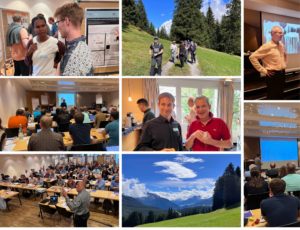 From Wednesday the 7th until Friday the 9th, group members attended the Swiss Nanoscience Institute’s annual meeting in Lenzerheide. Ph.D. students David Jaeger, Lukas Schneider, and Mathias Claus attended along with Prof. Poggio, who, since a little over a month, took over as director of the SNI. Lukas and Mathias presented posters entitled, “Functionalized nanowires as magnetic force transducers” and “Development of a new torque sensor with improved sensitivity for dynamic torque magnetometry”, respectively. David gave a talk on Friday morning entitled, “Towards hybrid optomechanics with hexagonal boron nitride”.
From Wednesday the 7th until Friday the 9th, group members attended the Swiss Nanoscience Institute’s annual meeting in Lenzerheide. Ph.D. students David Jaeger, Lukas Schneider, and Mathias Claus attended along with Prof. Poggio, who, since a little over a month, took over as director of the SNI. Lukas and Mathias presented posters entitled, “Functionalized nanowires as magnetic force transducers” and “Development of a new torque sensor with improved sensitivity for dynamic torque magnetometry”, respectively. David gave a talk on Friday morning entitled, “Towards hybrid optomechanics with hexagonal boron nitride”.
The meeting included a number of invited talks from Dr. Alexander Grimm (PSI), Prof. Sebastian Hiller (Biozentrum Basel), Dr. Walter Riess (IBM Zürich), and Prof. Tomaso Poggio (MIT), who gave a late-night lecture on “The science and engineering of intelligence” (and is Prof. Poggio’s father). A full program is here.
Group Members in at Spin Qubit 5
From Monday the 5th until Friday the 9th, research scientist Dr. Floris Braakman and Ph.D. student Liza Žaper attended the 5th Conference on Spin-Based Quantum Information Processing (Spin Qubit 5) at the Kongresszentrum in Pontresina, Switzerland. Floris gave an invited talk entitled, “Scanning probe microscopy for spin qubits”, and Liza presented a poster entitled, “Magnetic properties of cobalt-nanomagnets: towards spin qubit control”. The conference brings together world-leading researchers from the fields of solid state physics and spin-based quantum information processing.
August 2022
Group at CMD29 in Manchester
From Monday the 21st until Friday the 26th, group members attended the 29th General Conference of the Condensed Matter Division of the European Physical Society (CMD29) in Manchester, UK. Ph.D. student David Jaeger, post-doctoral researcher Dr. Francesco Fogliano, and Prof. Poggio attended the conference in person. Ph.D. student Daniel Jetter attended remotely. Francesco gave a talk entitled, “A tunable fiber Fabry-Perot cavity for hybrid optomechanics stabilized at 4K” in the mini-colloquium on “Nanomechanical and Electromechanical Systems”. Daniel gave a talk entitled, “Magnetic, thermal, and topographic imaging with a nanometer-scale SQUID-on-lever scanning probe” in the mini-colloquium on “Nanoscale Fabrication of Superconducting Devices and their Application”. The latter was organized by Prof. Poggio along with Prof. Dieter Kölle (Tübingen) and Prof. Paul Warburton (University College London).
Machine Shop / Poggio Lab BBQ
On Friday the 19th, we held our annual barbecue on the department’s roof-top with our colleagues from the Machine Shop, technicians, administrative staff, and friends. It was especially nice to see former administrator Audrey Fischer and post-doc alumnus Dr. Denis Vasyukov and his son Victor. Unfortunately, our attempt to precede the barbecue with some karting at the Sundgau track were thwarted by rain. Thanks to all who helped to organize and see you next year!
Mapping superconducting qubit circuits via scanning SQUID
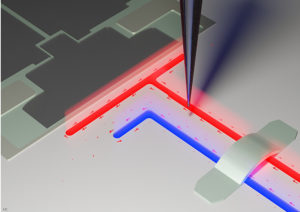 On Wednesday the 3rd, Applied Physics Letters published our paper entitled, Magnetic imaging of superconducting qubit devices with scanning SQUID-on-tip as a ‘featured’ article. The editors also highlighted the work as a ‘Scilight’ on the AIP website. The work describes experiments, in which we use a scanning superconducting quantum interference device (SQUID) to image the magnetic flux produced by a superconducting device designed for quantum computing. The nanometer-scale SQUID-on-tip probe reveals the flow of superconducting current through the circuit as well as the locations of trapped magnetic flux. In particular, maps of current flowing out of a flux-control line in the vicinity of a qubit show how these elements are coupled, providing insight on how to optimize qubit control. In the future, such maps could be used to design superconducting qubit circuits with less qubit decoherence to enhance quantum computing performance.
On Wednesday the 3rd, Applied Physics Letters published our paper entitled, Magnetic imaging of superconducting qubit devices with scanning SQUID-on-tip as a ‘featured’ article. The editors also highlighted the work as a ‘Scilight’ on the AIP website. The work describes experiments, in which we use a scanning superconducting quantum interference device (SQUID) to image the magnetic flux produced by a superconducting device designed for quantum computing. The nanometer-scale SQUID-on-tip probe reveals the flow of superconducting current through the circuit as well as the locations of trapped magnetic flux. In particular, maps of current flowing out of a flux-control line in the vicinity of a qubit show how these elements are coupled, providing insight on how to optimize qubit control. In the future, such maps could be used to design superconducting qubit circuits with less qubit decoherence to enhance quantum computing performance.
The experiments were carried out by former Ph.D. students Dr. Lorenzo Ceccarelli and Dr. Nicola Rossi during their time as post-docs in our group. They had help from Dr. Giulio Romagnoli. After Lorenzo and Nicola’s departure, Dr. Estefani Marchiori took over the work analyzing the data and putting it together for publication. The qubit circuits were provided by the group of Prof. Andreas Wallraff at ETH Zürich, where our main collaborator was Dr. Sebastian Krinner. Johannes Herrmann and Dr. Jean-Claude Besse were involved in the fabrication of the circuit at ETH.
July 2022
Luca Forrer and Aurèle Kamber win Image contest
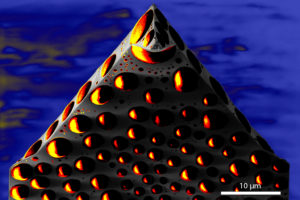 Ph.D. students Luca Forrer’s and Aurèle Kamber’s colorized scanning electron micrograph (SEM) of a cantilever contaminated by TorrSeal droplets was awarded a Scientific Jury Award at the the Annual Meeting of the NCCR SPIN in Pontresina in mid-June.
Ph.D. students Luca Forrer’s and Aurèle Kamber’s colorized scanning electron micrograph (SEM) of a cantilever contaminated by TorrSeal droplets was awarded a Scientific Jury Award at the the Annual Meeting of the NCCR SPIN in Pontresina in mid-June.
BBQ at the Birsköpfli
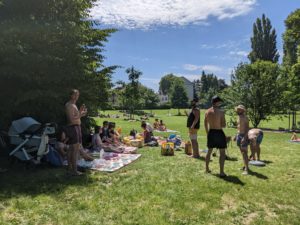 On the 3rd, we held our 6th annual group BBQ at the Birsköpfli park along the river. Group members and friends had a relaxing time enjoying the beautiful weather, eating, drinking, and cooling off in the river. See you next year!
On the 3rd, we held our 6th annual group BBQ at the Birsköpfli park along the river. Group members and friends had a relaxing time enjoying the beautiful weather, eating, drinking, and cooling off in the river. See you next year!
June 2022
Mathias Claus Wins Masters Prize
Ph.D. student Mathias Claus won the Masters Prize in Nanoscience for his thesis entitled, “Design, fabrication, and characterization of a highly sensitive Si3N4 paddle microbridge torque sensor for dynamic paddle magnetometry”. He carried out the thesis in our lab and then joined our group and the group of Prof. Ilaria Zardo as a Ph.D. student in April 2021. See the article in SNI INSight.
Prof. Poggio to Start as SNI Director
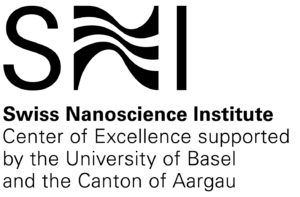 Starting August 1st, Prof. Poggio will take over as Director of the Swiss Nanoscience Institute (SNI) from Prof. Christian Schönenberger. Read more about the change in SNI INSight: here and here.
Starting August 1st, Prof. Poggio will take over as Director of the Swiss Nanoscience Institute (SNI) from Prof. Christian Schönenberger. Read more about the change in SNI INSight: here and here.
Giulio Earns Ph.D.
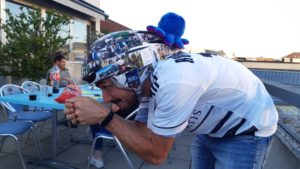 On Wednesday the 29th, Ph.D. student Giulio Romagnoli defended his thesis, entitled, “SQUID-on-tip sensors for real-space magnetic imaging of a chiral magnet”, earning his doctorate in physics magna cum laude. The exam was chaired by Prof. Ernst Meyer with Prof. Poggio, Prof. Ilaria Zardo, and Prof. Amit Finkler (Wiezmann Institute of Science, Israel) making up the committee.
On Wednesday the 29th, Ph.D. student Giulio Romagnoli defended his thesis, entitled, “SQUID-on-tip sensors for real-space magnetic imaging of a chiral magnet”, earning his doctorate in physics magna cum laude. The exam was chaired by Prof. Ernst Meyer with Prof. Poggio, Prof. Ilaria Zardo, and Prof. Amit Finkler (Wiezmann Institute of Science, Israel) making up the committee.
Giulio joined the group as a Ph.D. student in February 2017 to work on scanning SQUID microscopy of skyrmion-hosting materials. He was a member of our Nanoskyrmionics Sinergia collaboration, carrying out real-space magnetic imaging experiments of a chiral magnet, as well as other materials. He worked on developing and improving our fabrication of SQUID-on-tip sensors and on their application for imaging non-co-linear magnetic phases. He will stay on to conclude some ongoing experiments. Congratulations to Dr. Romagnoli!
Amit Finkler Visits
From the 28th to the 30th, Dr. Amit Finkler from the Wiezmann Institute of Science in Israel visited our group. He leads a research group looking into quantum-enhanced sensing techniques and is one of the inventors of the SQUID-on-tip scanning probes used in our group. He came to participate in the Ph.D. thesis committee of Ph.D. student Giulio Romagnoli and to give a talk about his work. His special seminar, entitled, “Computerized tomography of electron spins” took place on the afternoon of Wednesday the 29th.
Nanoskyrmionics Meeting in Basel
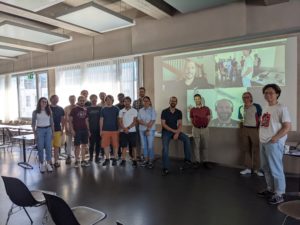 On the 15th, the group organized a meeting of the Sinergia Nanoskyrmionics, coordinated by Prof. Dirk Grundler from the EPFL. The meeting was held in the former mensa of the Department of Physics and followed by a dinner accross the street at Taverne Johann. Dr. Simon Philipp gave a short contribution at the end of the meeting updating the network on his and Dr. Boris’ Groß’s work on dynamic cantilever magnetometry of skyrmion-hosting materials. The meeting included a number of discussions on planned and active collaborations.
On the 15th, the group organized a meeting of the Sinergia Nanoskyrmionics, coordinated by Prof. Dirk Grundler from the EPFL. The meeting was held in the former mensa of the Department of Physics and followed by a dinner accross the street at Taverne Johann. Dr. Simon Philipp gave a short contribution at the end of the meeting updating the network on his and Dr. Boris’ Groß’s work on dynamic cantilever magnetometry of skyrmion-hosting materials. The meeting included a number of discussions on planned and active collaborations.
Group in Pontresina
From the 13th to the 15th, Ph.D. students Liza Žaper, Aurèle Kamber, and Luca Forrer; senior researcher Dr. Floris Braakman; and Prof. Poggio attended the Annual Meeting of the NCCR SPIN in Pontresina, Switzerland. On the 15th, both Liza and Aurèle gave talks entitled, “Cobalt Nanomagnets for Spin Qubit Control” and “A Nanowire Quantum Dot Scanning Probe”, respectively.
Visit of Dennis Christensen Comes to an End
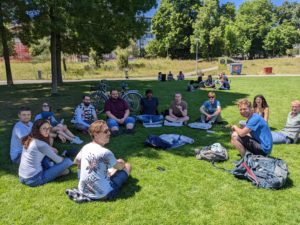 Dr. Dennis Valbjørn Christensen from the Department of Energy Conversion and Storage at the Technical University of Denmark has been visiting our group since March 30th. On the 10th, after many pleasant scientific exchanges and conversations within the group, Dennis bid the group farewell with pinsa and ice cream in the park. We’re looking forward to collaborating in the future and wish Dennis a pleasant summer break!
Dr. Dennis Valbjørn Christensen from the Department of Energy Conversion and Storage at the Technical University of Denmark has been visiting our group since March 30th. On the 10th, after many pleasant scientific exchanges and conversations within the group, Dennis bid the group farewell with pinsa and ice cream in the park. We’re looking forward to collaborating in the future and wish Dennis a pleasant summer break!
Thibaud and Simon Take New Jobs
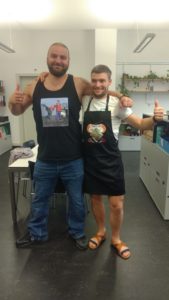 At the end of the month, both Dr. Thibaud Ruelle and Dr. Simon Philipp, who recently earned their Ph.D. degrees in the group, will move on to new jobs. Starting July 1st, Thibaud will start a post-doctoral project here in the department in the group of Prof. Richard Warburton, working on optimizing the ablation of fiber mirrors for high-finesse optical cavities. Simon will start in a research position at the Fraunhofer-Institüt für Werkstroffmechanik (IWM) in Freiburg, Germany. Good luck to you both in the new positions!
At the end of the month, both Dr. Thibaud Ruelle and Dr. Simon Philipp, who recently earned their Ph.D. degrees in the group, will move on to new jobs. Starting July 1st, Thibaud will start a post-doctoral project here in the department in the group of Prof. Richard Warburton, working on optimizing the ablation of fiber mirrors for high-finesse optical cavities. Simon will start in a research position at the Fraunhofer-Institüt für Werkstroffmechanik (IWM) in Freiburg, Germany. Good luck to you both in the new positions!
May 2022
SOLA Basel
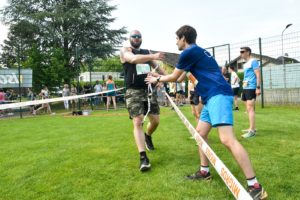 On Saturday the 21st, a team of group members and a two friends took part in the SOLA Basel relay race. The team of 10 runners, including post-docs Dr. Estefani Marchiori, Dr. Francesco Fogliano, Dr. Kousik Bagani, Dr. Simon Philipp, Ph.D students Hinrich Mattiat, Daniel Jetter, Liza Žaper, Prof. Poggio, and friends Thomas Gisler and Claire Micallef, ran under the name, ‘Dov’è Giulio?”. After the race, the team celebrated their 25th place (of 126) at the finish and together with other (slower) teams from the department on the department’s rooftop. Results are here and photos and videos here.
On Saturday the 21st, a team of group members and a two friends took part in the SOLA Basel relay race. The team of 10 runners, including post-docs Dr. Estefani Marchiori, Dr. Francesco Fogliano, Dr. Kousik Bagani, Dr. Simon Philipp, Ph.D students Hinrich Mattiat, Daniel Jetter, Liza Žaper, Prof. Poggio, and friends Thomas Gisler and Claire Micallef, ran under the name, ‘Dov’è Giulio?”. After the race, the team celebrated their 25th place (of 126) at the finish and together with other (slower) teams from the department on the department’s rooftop. Results are here and photos and videos here.
Group Retreat in Glarus
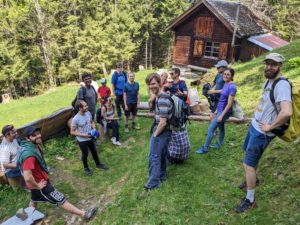 From Friday the 13th to Sunday the 15th, the group gathered at the Ferienhaus Restiberg above Linthal in the canton Glarus. The weather cooperated and 17 group members and 2 guests enjoyed a relaxing time in the mountains, hiking, eating, drinking, talking, and lots of laughing. A special thanks to Ph.D. student Luca Forrer for suggesting the spot near his hometown and for organizing the weekend. Photos are here.
From Friday the 13th to Sunday the 15th, the group gathered at the Ferienhaus Restiberg above Linthal in the canton Glarus. The weather cooperated and 17 group members and 2 guests enjoyed a relaxing time in the mountains, hiking, eating, drinking, talking, and lots of laughing. A special thanks to Ph.D. student Luca Forrer for suggesting the spot near his hometown and for organizing the weekend. Photos are here.
Simon Philipp Earns Ph.D.
On Wednesday the 11th, Ph.D. student Simon Philipp defended his thesis, entitled, “Magnetism of nano- to micrometer-sized anisotropic materials”, earning his doctorate in physics magna cum laude. The exam was chaired by Prof. Patrick Maletinsky with Prof. Poggio, Prof. Ernst Meyer, Dr. Boris Gross, and Prof. Mark Freeman (University of Alberta, Canada) making up the committee.
Simon joined the group in February 2017 to work on dynamic cantilever magnetometry (DCM) of nanometer-scale magnetic materials. He was a key member of our Nanoskyrmionics Sinergia collaboration and carried out experiments on a number of interesting samples, including GaV4Se8, magnetic mesocrystals, and magnetic Janus particles. Along with Boris, he helped deepen our understanding of how to use DCM to identify magnetic phase transitions and how to model the response of paramagnets and superparamagnets. Congratulations to Dr. Philipp!
April 2022
Estefani Wins University Research Grant
On the 26th, post-doc Dr. Estefani Marchiori was informed that she won a Research Fund Grant from the University with her proposal for “Real-space imaging of spin textures in a polar magnet”. The 9-month-long project begins in July 2022, will be led by Estefani, and will take place in our lab. Congratulations Estefani!
Hinrich and Lukas at Nanowire Week
From the 25th to the 29th, Ph.D students Hinrich Mattiat and Lukas Schneider attended the 2022 edition of ‘Nanowire Week‘, held in Chamonix, France. The conference hosted talks, posters, and discussion on the progress of nanowire-related research, ranging from growth to fundamental studies and applications.
March 2022
Group in Barcelona for NanoMRI 7
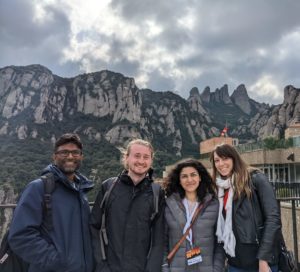 From the 21st to the 25th, Ph.D students Liza Žaper, Andriani Vervelaki, Daniel Jetter, and Hinrich Mattiat, as well as post-doc Dr. Kousik Bagani, and Prof. Poggio attended the ‘NanoMRI 7‘ conference held at Institut de Ciències Fotòniques (ICFO) in Barcelona, Spain. The conference is the 7th edition of a meeting started in 2006 at Cornell University. The conference brings together scientists and engineers interested in the field of ultrasensitive spin detection and nanoscale magnetic resonance imaging. Areas of interest include nanomechanical sensors, spin defects in diamond, ultrasensitive scanning probe microscopy, and quantum sensing techniques that push the limits of measurements.
From the 21st to the 25th, Ph.D students Liza Žaper, Andriani Vervelaki, Daniel Jetter, and Hinrich Mattiat, as well as post-doc Dr. Kousik Bagani, and Prof. Poggio attended the ‘NanoMRI 7‘ conference held at Institut de Ciències Fotòniques (ICFO) in Barcelona, Spain. The conference is the 7th edition of a meeting started in 2006 at Cornell University. The conference brings together scientists and engineers interested in the field of ultrasensitive spin detection and nanoscale magnetic resonance imaging. Areas of interest include nanomechanical sensors, spin defects in diamond, ultrasensitive scanning probe microscopy, and quantum sensing techniques that push the limits of measurements.
On Tuesday the 22nd, Kousik presented a poster entitled, “Magnetic, thermal, and topographic imaging with a nanometer-scale SQUID on-cantilever scanning probe”. On Thursday the 24th, Liza and Hinrich presented posters entitled, “Magnetic properties of cobalt nanomagnets: towards spin qubit control” and “Nanowires as mechanical force sensors for scanning probe microscopy”, respectively. Prof. Poggio gave a talk on the morning of the same day entitled, “Imaging weak magnetic field patterns on the nanometer-scale”. A video of the talk is available here and videos of many of the other talks at the conference can be seen here.
Pictures from the conference are available here.
Visit to EMPA
On the 15th, Prof. Poggio visited the Department of Advanced materials and Surfaces at EMPA (Swiss Federal Laboratories for Materials Science and Technology) in Dübendorf, Switzerland. There he gave a talk entitled, “Nanoscale magnetic field imaging for 2D materials”.
Talk in Madrid
Between the 7th and 9th, Prof. Poggio attended a meeting on Quantum materials and devices at the nanoscale, in Madrid, which was organized by the COST action on “Nanoscale coherent hybrid devices for superconducting quantum technologies”. Prof. Poggio gave a talk on the morning of the 8th entitled, “Magnetic, thermal, and topographic imaging with a nanometer-scale SQUID-on-lever scanning probe”.
SQUID-on-lever Paper Published
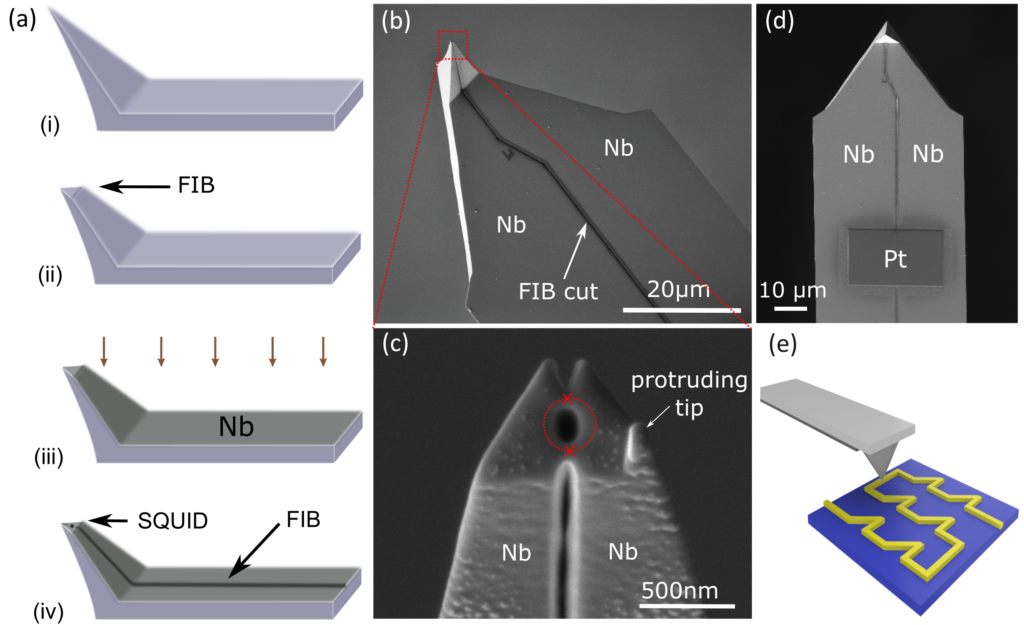 On the 1st, Physical Review Applied published our article describing a new type of scanning probe, which we have developed, based on a nanometer-scale superconducting quantum interference device (SQUID). The work is entitled, Magnetic, thermal, and topographic imaging with a nanometer-scale SQUID-on-lever scanning probe. In the paper, we demonstrate a scanning probe that combines the magnetic and thermal imaging provided by an on-tip SQUID with the tip-sample distance control and topographic contrast of a noncontact atomic force microscope (AFM). We pattern the nanometer-scale SQUID, including its weak-link Josephson junctions, via focused-ion-beam milling at the apex of a cantilever coated with Nb, yielding a sensor with an effective diameter of 365 nm, field sensitivity of 9.5 nT/√Hz, and thermal sensitivity of 620 nK/√Hz, operating in magnetic fields up to 1.0 T. The resulting SQUID-on-lever probe is a robust AFM-like scanning probe that expands the reach of sensitive nanometer-scale magnetic and thermal imaging beyond what is currently possible.
On the 1st, Physical Review Applied published our article describing a new type of scanning probe, which we have developed, based on a nanometer-scale superconducting quantum interference device (SQUID). The work is entitled, Magnetic, thermal, and topographic imaging with a nanometer-scale SQUID-on-lever scanning probe. In the paper, we demonstrate a scanning probe that combines the magnetic and thermal imaging provided by an on-tip SQUID with the tip-sample distance control and topographic contrast of a noncontact atomic force microscope (AFM). We pattern the nanometer-scale SQUID, including its weak-link Josephson junctions, via focused-ion-beam milling at the apex of a cantilever coated with Nb, yielding a sensor with an effective diameter of 365 nm, field sensitivity of 9.5 nT/√Hz, and thermal sensitivity of 620 nK/√Hz, operating in magnetic fields up to 1.0 T. The resulting SQUID-on-lever probe is a robust AFM-like scanning probe that expands the reach of sensitive nanometer-scale magnetic and thermal imaging beyond what is currently possible.
The publication is our group’s first as part of the FET-Open collaboration, which we are leading, Focused Ion Beam fabrication of superconducting scanning Probes (FIBsuperProbes). This project has received funding form the European Union’s Horizon 2020 research and innovation program. The research described in the paper was led first by Dr. Marcus Wyss, a former Ph.D. and post-doc who now works at the SNI Nano Imaging Lab and later by post-doc Dr. Kousik Bagani. From our group, Ph.D. students Daniel Jetter and Adriani Vervelaki, as well as post-doc Dr. Estefani Marchiori and research scientist Dr. Boris Gross worked on the project. Dr. Joost Ridderbos of the Schönenberger group helped with the deposition of high-quality superconducting Nb and Dr. Sebastian Gliga of the PSI provided artificial spin-ice samples.
February 2022
Physics II Starts
On the 24th, Prof. Poggio’s Bachelor lecture, Physics II: Electromagnetism and optics, started. The lecture takes place on Thursdays and Fridays from 13:00 to 15:00 in GHS1 in-presence and without restrictions. Videos of last year’s lecture, which took place remotely are available here.
Review Highlighted on the Cover
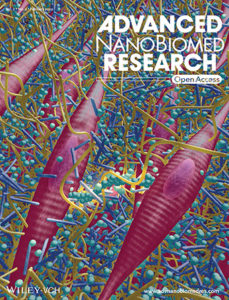 On the 8th, Advanced NanoBiomed Research published a review article by Ph.D. student Mr. Fabian Züger (FHNW), who works on an SNI Ph.D. Project with Dr. Maurizio Gullo (FHNW), Prof. Anna Marsano (Basel Department of Biomedicine), and Prof. Poggio. The paper was highlighted with a dedicated cover to the issue, showing an artistic rendering of biofabricated cardiac tissue emended in a nanocomposite doped hydrogel. In the review, the authors review current research on bioprinted conductive and stimuli responsive tissues using nanocomposites. Combining biofabrication techniques with intrinsically conductive nanocomposites is a promising way to achieve relevant physiological conditions in electrophysiological human tissue like cardiac and neural tissue.
On the 8th, Advanced NanoBiomed Research published a review article by Ph.D. student Mr. Fabian Züger (FHNW), who works on an SNI Ph.D. Project with Dr. Maurizio Gullo (FHNW), Prof. Anna Marsano (Basel Department of Biomedicine), and Prof. Poggio. The paper was highlighted with a dedicated cover to the issue, showing an artistic rendering of biofabricated cardiac tissue emended in a nanocomposite doped hydrogel. In the review, the authors review current research on bioprinted conductive and stimuli responsive tissues using nanocomposites. Combining biofabrication techniques with intrinsically conductive nanocomposites is a promising way to achieve relevant physiological conditions in electrophysiological human tissue like cardiac and neural tissue.
QSIT General Meeting
The 2022 QSIT General Meeting was held from the 2nd to the 4th in Arosa, Switzerland. Post-doc Dr. Estefani Marchiori; Ph.D. students Andriani Vervelaki, Daniel Jetter, and Mathias Claus; and Prof. Poggio attended. On the morning of the 4th, Estefani gave a talk entitled, “Real-space imaging of magnetic phases in Cu2OSeO3 crystal”. Thank you to Klara Berg for organizing and a special thanks to the Director, Prof. Klaus Ensslin, for the last in a long series of excellent meetings.
QSIT Winter School
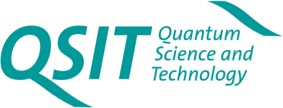 On the 1st, Prof. Poggio gave a lecture at the 2022 QSIT Winter School in Arosa, Switzerland entitled, “Nanoscale magnetic field imaging for 2D materials”, based on the homonymous review, which we recently wrote together with the Degen Group. Download the slides and lecture notes here. The school started on the 31st of January and ended on the 1st. Ph.D. students Andriani Vervelaki and Mathias Claus both attended the school.
On the 1st, Prof. Poggio gave a lecture at the 2022 QSIT Winter School in Arosa, Switzerland entitled, “Nanoscale magnetic field imaging for 2D materials”, based on the homonymous review, which we recently wrote together with the Degen Group. Download the slides and lecture notes here. The school started on the 31st of January and ended on the 1st. Ph.D. students Andriani Vervelaki and Mathias Claus both attended the school.
January 2022
Ph.D. Student Starts
On the 3rd, Aurèle Kamber started as Ph.D. student in the group. Aurèle received his Bachelor of Science and his Masters of Science both in Nanoscience from the University of Basel in 2019 and 2021, respectively. In September 2020, Aurèle completed joined our lab as a Masters student. After a short break, we are happy to announce that he now joins us for his Ph.D. Welcome back Aurèle!
